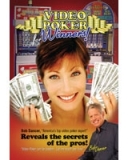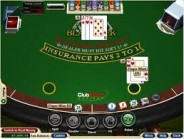
Bob Dancer's Video Poker For Winners!

Video Poker - Winning the Wrong Way or Losing the Right Way
Sometimes I hear the question posed about whether I'd prefer to win the wrong way or lose the right way? In truth, there's not enough information there to make a choice, although it's tempting for Bob Dancer is one of the world's foremost video poker experts. He is a regular columnist for Casino Player, Strictly Slots, and the Las Vegas Review-Journa land has written an autobiography and a novel about gambling. He provides advice for tens of thousands of casino enthusiasts looking to play video poker. Bob's website is www.bobdancer.com many to say that winning must be better. I don't believe that.
Bob Dancer is one of the world's foremost video poker experts. He is a regular columnist for Casino Player, Strictly Slots, and the Las Vegas Review-Journa land has written an autobiography and a novel about gambling. He provides advice for tens of thousands of casino enthusiasts looking to play video poker. Bob's website is www.bobdancer.com many to say that winning must be better. I don't believe that.
My first Las Vegas gambling game was blackjack. Sometimes I was dealt a hard fourteen (e.g. a nine and a five) against a dealer seven. The correct play is very easy --- I should take another card. This turns out badly much of the time but it's still the best play. By a mile.
When I'd take a card and exceed 21 (and hence lose) sometimes I was told by the dealer or other players, "Well, at least you lost the right way." I never found this very comforting. I still lost.
Sometimes you'd see other players (never me) in the same position refuse to take another card. This would usually cause them to lose. After all, the dealer has to break for this player to win and that happens well less than half the time. When this faulty strategy works, sometimes the dealer or pit critter would compliment the player. After all, the more players make stupid plays like this, the better the bottom line for the house will be.
I'm a lot more concerned with the process of how I make decisions than the actual results of the decisions. Robert Rubin, former Treasury Secretary, spoke on this subject in a 1999 commencement address at the University of Pennsylvania. Rubin said, "It's not that results don't matter. They do. But judging solely on results is a serious deterrent to taking risks that may be necessary to making the right decision. Simply put, the way decisions are evaluated affects the way decisions are made."
Let's look at three concrete video poker examples that illustrate the choice between results and process. It's your last hand of the night and you're down twenty credits at Deuces Wild. You are dealt Kh Qh Jh Th 9h. Holding the straight flush is worth 45 or 50 or so, depending on the pay schedule of the game. Tossing the 9h and going for the royal flush is worth between 90 and 100 coins, again depending on the pay schedule. While going for the royal is the correct play, there is no guarantee it will work better THIS TIME. In fact, there is better than a 6-out-of-10 chance that you'll end up with nothing at all.
The right PROCESS is to toss the nine. If you care a lot about whether you win TODAY, or perhaps your spouse is a "bottom line only" type of person, you just might keep the nine. It's a HUGE mistake to do so (about 50 credits worth of mistake), but if you get "punished" somehow for bringing home a negative score (either by yourself or someone else), it might make it tempting to go home with the guaranteed win.
Another example is using a "double up to catch up" (Martingale) type of betting progression. If you lose at quarters, you start playing 50¢. If you still lose, you switch to dollars. If you still lose you go with $2, and then $5, and then $10. This works most of the time, but when it doesn't, you lose a ton. Trading off many small wins against occasional really big losses doesn't make a lot of sense, or dollars. It's nice to usually win. But your overall score is what matters, and your overall score includes some large losses that wipe out your wins.
Another example of this "results over process" thinking comes from your score. Let's say you're in an event that returns $100 an hour in Expected Value (perhaps a $5 game that adds up to 100.5% when you include everything) and also assume that usually you don't find opportunities nearly this lucrative. You've been losing most of the promotion, but in the past two hours you have finally eased ahead.
The choice is to go home a small winner or to continue to gamble. (Assume that you have plenty of cash-on-hand, energy, and there are no other gambling opportunities remotely comparable.) To my mind you should continue to play. This is a GREAT opportunity that doesn't come around very often. Whether you win or lose, it's a fantastic play. The "results only" person just may well argue that since he's finally ahead, it's better to lock up that win and quit playing.
I cannot see this "results only" philosophy working over time. You have to play while the opportunity is available. Quitting while ahead may make sense if coming back tomorrow will present you with the same chances for success. But if tomorrow's best game is worth $20 an hour, locking up today's win by quitting now is VERY EXPENSIVE.
Let's go back to the original question of whether it's better to win the wrong way or lose the right way. I think it is better to ALWAYS play the right way, so this choice is never relevant.

